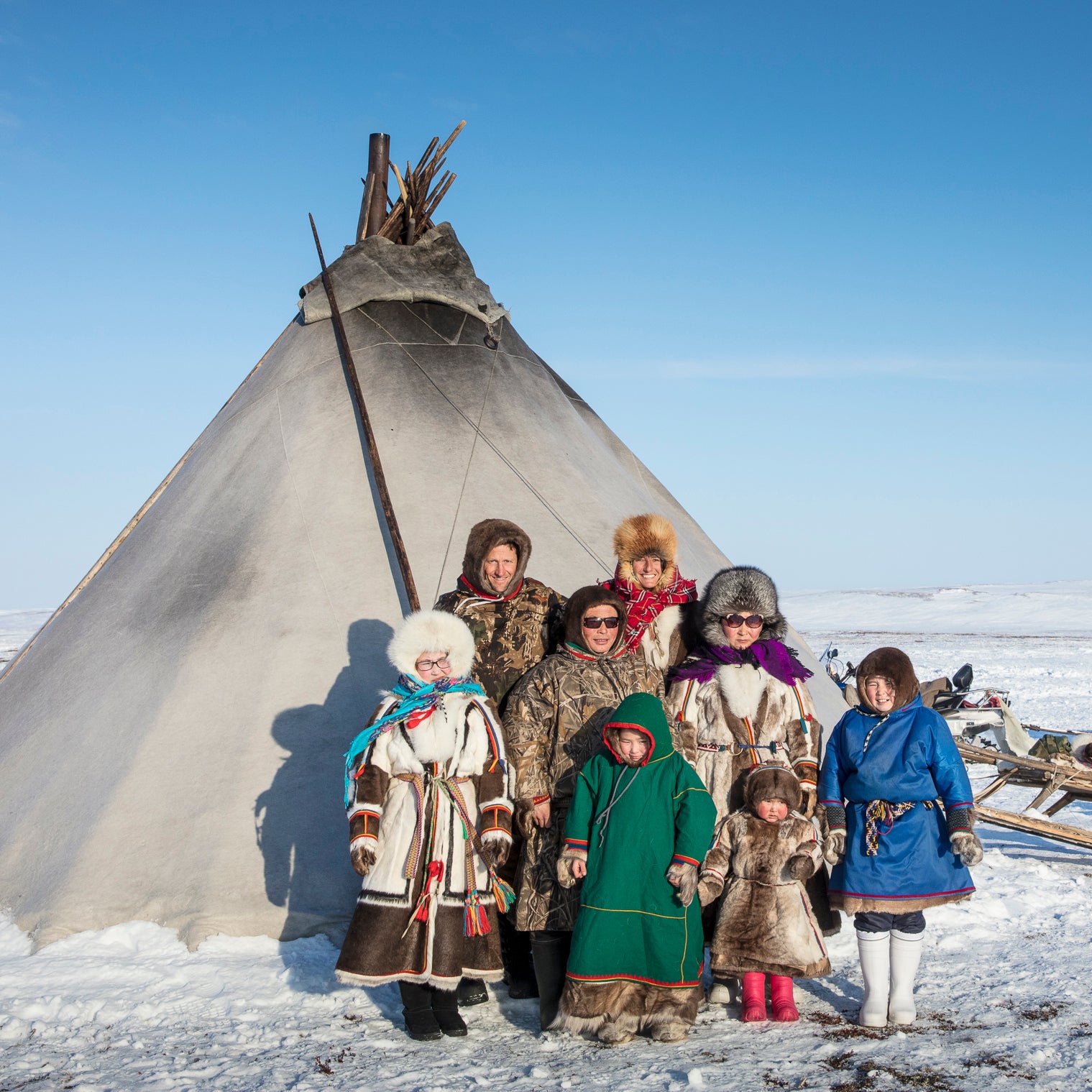A hand-stitched reindeer-skin Siberian teepee might seem as removed from an Airstream as Russia is from Arizona, but over a few weeks in March, Jen and I started to wonder if we shouldn’t trade up. We traveled to Siberia’s Yamal Peninsula, north of the Arctic Circle, to live among nomadic reindeer herders called the Nenets for a story about global connectivity and the lengths it takes to get off the grid. Now that we live full-time in Artemis, our Airstream, we think of ourselves as nomads, but Russia gave us some perspective.
Closer in culture and existence to the Inuit than to the average Muscovite, the Nenets follow reindeer migration as the animals chase foliage through the changing seasons. They travel in small brigades, often family groups, and live in teepees, called chums. Our brigade—which they called #20, in a classic, nameless throwback to Soviet control—consisted of six families in five chums and a herd of about 3,700 head. After a winter at the farthest southern range, the Nenets were laboring north when we arrived, headed more than 300 miles to the northernmost pastures, and then back again before the coldest months. From sometime in February through November, they would move their camp and herds every two to three days.
Having seen what it takes to migrate five homes, six families, and a drove of half-wild animals by reindeer-drawn sledges, I will never again complain about the difficulties of moving Artemis. Migration days start early, around 6 a.m., and by the time our family had deconstructed our chum, packed everything onto 12 sleds, and corralled and harnessed the work animals for the journey, it was usually 1 p.m. or later. That might sound inefficient, but the Nenets don’t rush. Do what must be done, then move. If we arrived after dark, so be it. “In winter, it’s always dark here. And much colder than this,” Alexei, the father figure in our chum, told me when I asked why they didn't hurry.
Relative to our Western mindset of effectiveness and caution, it was tough to swallow, but the truth is the Nenets read the weather just fine and always get where they’re going. That’s lesson one: Don’t hurry needlessly. We often try to go too far, take on too much, move too often.
On day four of our stay, Alexei and his wife, Rosa, load up a snowmobile and head to the nearest town for supplies. Though they leave by 9 a.m., it’s a 50-mile journey, and they didn’t return until after dark. When they did, Rosa was primped and beaming, and Alexei had what looked like new clothes. They’d also brought back tomatoes and cucumbers for dinner and eggs for breakfast the next morning—commodities that are basically unheard of in the meat, fish, and dried-food existence of the tundra. At home, Jen and I resisted going into town, which felt like unnecessary chaos. But here, it’s a welcome relief from an otherwise unrelenting day to day. Lesson two: When you’re living off grid, civilization can be a welcome respite.
Throughout the day, Rosa and Alexei were gone, the wives from neighboring chums cared for our family’s three-year-old, Marianna, and looked in on me and Jen from time to time to make sure weren’t hungry and that the fire hadn’t gone out. (We were warned against messing with the fire lest we burn down the chum.) When you live in an Airstream, life can get lonely, and the collective feeling of the brigade is a reminder of the importance of community. Yes, solitary wilderness can be a blessed gift for headspace and productivity, but it can also make you kooky and cut off. Campgrounds, when you visit them, are a good place for socializing, and those random trucks passing by your backwoods camp might be worth flagging down for a chat. In the tundra, any visitor who happens on the camp is welcomed inside, handed a steaming sweet tea as soon as the kettle boils, and offered a bed for the night. It’s easy to lose sight of connection and humanity when we’re plowing through stunning settings and constant workouts. But when I die, I imagine that my life will come down to meaningful chats over fading fires.
Jen and I spent only two weeks with the Nenets, and that was perhaps the most instructive lesson: While we can always pack up our things, sell the Airstream, and return to our home, for Alexei, Rosa, Marianna, and all the other Nenets, it’s life, not a lifestyle. It’s a privilege we often overlook. A month after they dropped us off in the administrative center of Yarsale, brigade #20 is probably some 124 miles north, dismantling and erecting their chums every few days, following the reindeer. Jen and I have the freedom and means to chase something else—whatever it is we’re after, really—and each time we set up Artemis, we’re more conscious than ever to sit down, pour a drink, and recognize our quiet spot and how easy it was to get here.

